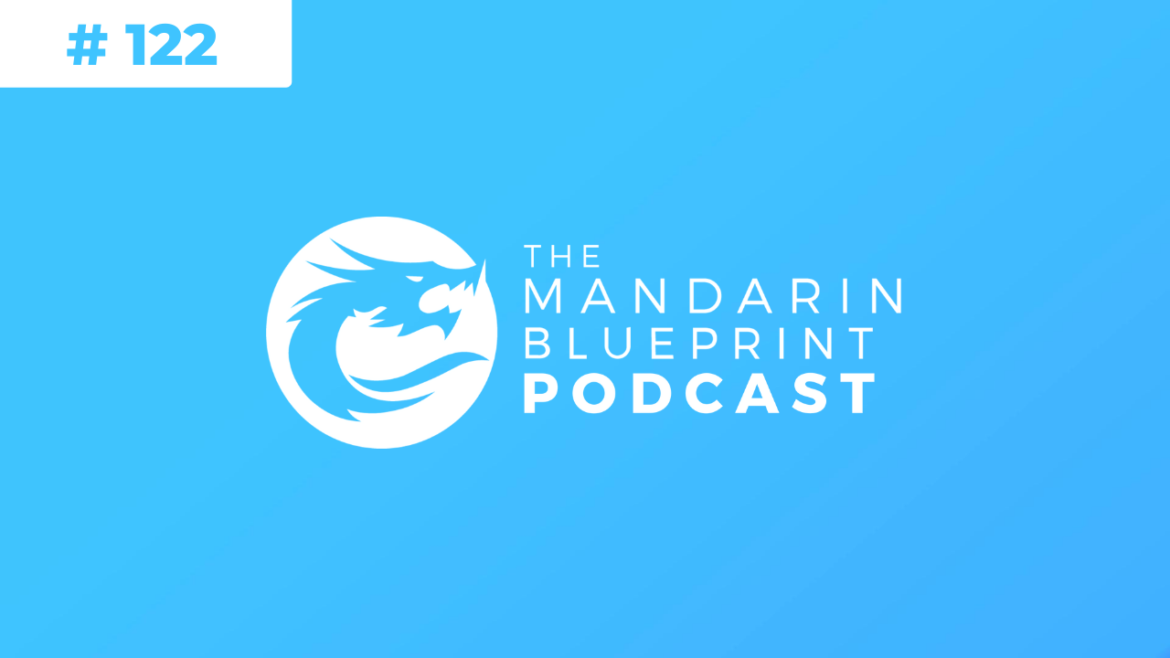欢迎光临! Welcome!
You can now subscribe to the podcast by the links below, or you can subscribe by copying the following URL into your favorite podcast APP.
The Mandarin Blueprint Podcast focuses primarily on The Blueprint online curriculum. Creators Luke Neale & Phil Crimmins answer questions and comments, discuss topics related to China and Mandarin learning, and have special guests.
Want to learn how to speak fluent Chinese fast? Join our free Webinar right here.
欢迎光临! Welcome!
You can now subscribe to the podcast on iTunes, Stitcher, Spotify, or you can subscribe by copying the following URL into your favorite podcast APP:
https://www.mandarinblueprint.com/feed/podcast/
The Mandarin Blueprint Podcast focuses primarily on The Mandarin Blueprint Method online curriculum. Creators Luke Neale & Phil Crimmins answer questions and comments, discuss topics related to China and Mandarin learning, and have special guests.
0:00 Affiliate Link & Reviews
Become a Mandarin Blueprint Affiliate
Leave us a Google Business Review 🙂
1:23 Grammar Point – How to Use 把 bǎ in Chinese
把手机放在书桌上。
Bǎ shǒujī fàng zài shūzhuō shàng.
Put the phone on the desk.
她用手机来发短信。
Tā yòng shǒujī lái fā duǎnxìn.
She uses a mobile phone to send texts.
吃这个热狗。
Chī zhèige règǒu.
Eat this hot dog.
把这个热狗吃完。
Bǎ zhèige règǒu chīwán.
Finish eating this hotdog.
我听错了明天出发的时间。
Wǒ tīngcuò le míngtiān chūfā de shíjiān.
I misheard tomorrow’s departure time.
我爱上了她。
Wǒ ài shàng le tā.
I fell in love with her.
1. Adding a result
把这个热狗吃完。
Bǎ zhèige règǒu chīwán.
Finish eating this hotdog.
把手机用坏了。
Bǎ shǒujī yònghuài.
Break the phone (through over-use).
2. Adding a location
把手机放在书桌上。
Bǎ shǒujī fàng zài shūzhuō shàng.
Put the phone on the desk.
把钱放在包里。
Bǎ qián fàng zài bāo lǐ.
Put the money in the bag.
3. Adding a direction
把东西带回来。
Bǎ dōngxi dài huílái.
Bring the stuff back.
把包扔下去。
Bǎ bāo rēng xiàqù.
Throw down the bag.
4. Adding quantity to the verb
请你把门开一下。
Qǐng nǐ bǎ mén kāi yīxià.
Please open the door a moment.
他把他的电话号码又说了一次。
Tā bǎ tāde diànhuà hàomǎ yòu shuō le yīcì.
He once again said his phone number.
把手机放在书桌上。
Bǎ shǒujī fàng zài shūzhuō shàng.
Take the mobile phone and put [it] on the desk.
把这个热狗吃完。
Bǎ zhèige règǒu chīwán.
Take this hotdog and finish eating [it].
把手机用坏了。
Bǎ shǒujī yònghuài le.
Took the mobile phone and broke [it] (through over-use).
把钱放在包里。
Bǎ qián fàng zài bāo lǐ.
Take the money and put [it] in the bag.
把东西带回来。
Bǎ dōngxi dài huílái.
Take the stuff and bring [it] back.
把包扔下去。
Bǎ bāo rēng xiàqù.
Take the bag and throw [it] down.
22:31 Comments & Emails
Jason Pon on 试试 in Context
In the legacy comments section, you provided this example sentence: 这件衣服可以试穿吗. Here, it put the object before the verb.
In the following sentence for 分 in context, 把 is used to bring the ‘children’ object in front of the ‘fenkai’ verb. 把这两个小朋友分开。
Why then is 把 not used in the sentence above if the construction is rather similar? Is it because it is a question and the object is supposed to precede the verb interrogative? Thanks!!!
25:51 Comments & Emails
Jason Pon by Email
Hey Phil,
Thanks for the detailed Loom explanation. As you said, it is helpful to be aware of the use of 把 without over-analyzing. This sentence in my flashcards 你每一页都要认真地看 appears to have the subject before verb and it looks like there is ‘dressing’ on the 看 which is the 认真. Is that why the subject is before the verb? I would’ve thought the sentence to be 你要认真地看一页都。 Or is this a psychological verb, which is why no 把 is used?
Thanks!
30:28
Richard Storrie on Level 16 Complete
Many thanks for putting this course together. Its great to be able to read, write and speak full sentences in a relatively small amount of time. Despite several attempts / false starts with other Chinese courses this is the first time I have been able to write in Chinese. Your methods definitely work despite me having what I would consider to be a poor memory. A little tip for others- I’m finding writing Characters in the steam on the shower cubicle glass is great practice and another way to gain a few more minutes practice each day.
32:59
Soren Korsbaek on Vocab Unlocked from 吉
Out of sheer curiosity I put the above sentence into Google Translate which provides the following pinyin:
“Tā hěn xǐhuān dàn jítā.”
It’s incredibly cool to know with confidence Google Translate is wrong and this is ‘tan’ (second tone) without having to look it up. Thanks for an excellent course!
35:17
Soren Korsbaek on Vocab Unlocked from 亏
I thought I’d flag a sentence I can’t make out a sensible meaning from above:
“这种亏我们吃太多了。”
“This loss we eat too much?”
36:36
Jeff Johnson on 和 in Context
So, I am wondering. It was said that if we can understand the sentence we can mark it as correct and move on. I am understanding the written sentences just fine. But some of the recordings in anki are hard for me to really feel like I understand what is being said.
At this point I am marking it correct and I expect that at some point my ability to keep up with the recordings will improve. This is correct right?
39:58
John Nomura on BONUS: The HOLISTIC Chinese Learning Approach
Lots of people teaching Chinese emphasize that you need to be reading comprehensible input to really start acquiring the language fast. And then they tell you to go find content where you know 98% of the characters. Good luck finding that. Of course, now I know that I should have been learning the 1,500 or 3,000 or so most frequent characters so that I can find comprehensible input. Even if knew that, I didn’t have a good method for memorizing the characters. So, now I feel that I have
a goal that I can achieve. I’ve been studying Chinese for quite a while using just the pinyin but it is crazy difficult to keep all “same sounding” characters straight. You really need to learn the characters – no way around it. So glad that I’m finally using a good method to acquire Chinese.
41:51
Christopher Thompson on Make a Movie 聘
I figure this question will be answered in the next lesson,
but… Is this British “hire”, i.e. American “rent”?
42:43
Ija on Vocab Unlocked from 消
I’d like to think that 消息 is personal news and not broadcasted news (新闻). News so personal that it tends to take your breath away (消你的息。。哈哈).
And when food goes through the digestive system, the food disappears (消) and change (化) into carbs/protein/fat/micronutrients.
43:42
Ija on 没有 in Context
A vegan walks into the shop and points to the vegetarian
sandwichA: 这个?有没有Mayo?
B:没有Mayo
A:??
44:12
Heng Bao on Welcome! 3 Things to Do Right Away
From comment above “if you know how to read, write, and pronounce a character”.
What is the difference between read and pronounce?
46:38
Christopher Thompson on Make a Movie 叶
Is it just a coincidence that leaf (叶) and page (页) both have the same sound? In English the pages of a book can be referred to as leaves, and we leaf through pages. In Spanish there is something similar. Sheets of paper are ‘ojas’ as are the leaves on a tree. I feel like the fact that pages are flat and wide, like leaves, and that early writing surfaces were likely made of leaves, or were simply leaves, makes a connection there that is
reflected in more than one language. Just curious. In any case, it helps me remember the words.
48:24
Jonathan Evans on 9. How to Integrate Chinese Characters, Vocabulary, and Grammar
Only thing I wish is that the lessons were longer throughout the various programs.
I find it easier to take in 10-15 minutes of content as straight study, instead of shorter 2-3 minute chunks.
51:36
Julian Laffey on Make a Movie 浪
How does this differ from 波 ?
54:05
Jason Pon on 空间 in Context
2 questions
父母要给孩子留一点儿空间
要 translates to ‘should’ for ‘should give…’. Is this part of longer form content that provides context? Otherwise, how would you ensure this doesn’t translate to ‘will’ – because I feel ‘parents will give’ vs ‘parents should give’ are very different ideas.这里的空间好小。
I would’ve thought the 很 would be used instead of 好 to describe that ‘very little’. Can you help me understand why 好 is used?
56:52
Jason Pon on 深 in Context
每个父母对孩子的爱都很深。
A bit thrown off by the ordering here.
-What is the function of 的?
– is 爱都 backwards? Why is ‘dou’ after ‘ai’?Am I understanding the literal translation correctly – every parent for their children loves every deeply?
1:00:45
Jason Pon on 试试 in Context
遇到麻烦时一定要多试试.
Is 时 supposed to mean the ‘when’ in the translation? Could the sentence also be 遇有到麻烦,一定要多试试?
1:02:48
Jason Pon on 刀子 in Context
一看到小孩子拿刀子,父母就很担心。
I reckon 拿 can be both ‘hold’ and ‘pick up’ as per the translation ?
1:03:40
Jason Pon on 计划 in Context
我计划明天去拍照
and
我们计划明年结婚。have 们计 before the time. Is this an exception for this verb? I believe the rule is that time comes before the verb.
1:08:21
Jason Pon on 别 in Context
2 questions. Thanks in advance!
1) 你别再说了 – the translation is ‘don’t keep talking’. I’ve only seen 再 as a single occurrence of a future action, Here, the translation is continuous in nature rather than single occurrence.2) 别伤害爱你的人. Shouldn’t the order be ‘你爱’ instead of ‘你爱’ as it is ‘people you love’? This way seems more intuitive in the general subject verb object sense.
1:12:25
Jason Pon on 别人 in Context
不要随便相信别人
Could this also have worked with 别随便相信别人? If so – would’ve been a good way to see 别’s versatility in the same sentences. ‘Don’t do this….other people’
1:13:24
Jason Pon on 加班 in Context
最近年轻人加班的时间越来越长了
Is the ‘de’ hear relating the young people’s overtime with ‘shijian’?
Lately, the shijian/time that young people are working overtime is becoming longer/greater?
I want to make sure I’m understanding this grammar.
1:15:14
Jason Pon on 前天 in Context
2 Questions here – thanks!
1) 我前天去了国外
Can you help me understand why 外 is after 国 to indicate leaving the country? Since I know this is difference from 外国 which means ‘foreign’.2) 前天早上我放在桌子上的面包不见了
What I am trying to work on is being able to keep be cognizant of the ‘phrase’ that the 的 is connecting to the subject, or in this case, 面包. I read this as ‘(I) can’t see the bread that I put on the table 2 morning’s ago’. Is it correct to see ‘前天早上我放在桌子上’ as the entire phrase that should be connected via the 的?
58:06 Movies!
This blog post explains the theory behind Movie Scenes and learning characters.
Will Raley on Make a Movie 姐
KEYWORD: 姐 jiě Older Sister
Actor: ji-
Set: -e
Room within Set (tone): Living Room
Prop(s): 女 (Brie Larson), 且 (Bookcase)Make a movie:
1. ji- at -e’s Living Room
2. Brie Larson’s OLDER SISTER is locked in the Bookcase (且)
3. Brie Larson (女) cries for ji- to break open the Bookcase
4. ji- with all her power breaks open the Bookcase
5. Brie Larson is reunited with her OLDER SISTER (姐)
1:22:59
Will Raley on Make a Movie 宜
KEYWORD: 宜 yí Suitable
Actor: Y
Set: -Ø childhood home
Room within Set (tone): Kitchen
Prop(s): 宀 (Trash Bin), 且 (Bookcase)Make a movie:
1. Y at -Ø childhood home’s Kitchen
2. Y is there to gain a new Bookcase (且) for herself (as long as it is SUITABLE for her)
3. The Bookcase she sees there is not SUITABLE because is it very ugly
4. Y is angry that she went all that way for a non-SUITABLE Bookcase
5. Y tosses the Bookcase in the Trash Bin (宀)
6. Y thinks the Bookcase is SUITABLE (宜) for that at least
1:24:17
Will Raley on Make a Movie 北
KEYWORD: 北 běi North
Actor: Brian
Set: -ei
Room within Set (tone): Living Room
Prop(s): 冫(Ice),丨(Gandalf’s staff), 匕 (Chinese spoon)Make a movie:
1. Brian at -ei’s Living Room
2. Brian wants to know which direction NORTH is
3. Brian drops a Chinese spoon (匕) on the floor
4. Brian then uses Gandalf’s staff (丨) to magically make the Chinese spoon point NORTH
5. Brian looks NORTH and can see the Ice (冫) of the NORTH (北) pole
1:25:17
Ric Santos on Make a Movie 场
Ch-actor is now a general of his army in his – ang set. He built a Trojan horse (my prop) with built-in wheels for mobility on land ( 土) . This could be a perfect attraction to trap his unsuspecting enemies in a gathering place 场.
Extra : He could let them bring the Trojan horse right at his opponet’s field 客场,or their public square 广场, or even their marketplace 市场. And it would be a terrible scene 现场 indeed.
1:27:24
Ric Santos on Make a Movie 控
K-actor worked (工) hard to clean and emptied (空) his backyard in the -ong set. But later he left the backyard empty for sometime. Then suddenly strangers jumped over the fence , came in and invaded his backyard. Reacting quickly , K-actor took the upper hand 扌; He drove the strangers away and guarded his backyard with his arm-y (hand=arm) and took control 控 of his backyard again.
K-actor learned his lesson: emptiness can be easily manipulated 控 by others.
1:29:13
Ric Santos on Make a Movie 护
Humpty Dumpty lives in the null set. Installed in his bathroom is a mechanized window, similar to a bank tellers window 户. To open and get fresh air, he uses his hands 扌to crank the gears to open the window. In this way, he will not fall into the backyard whenever he looks down from this window. He is well-protected 护。( All the while a nurse 护士 keeps an eye on him and keeps his passport 护照 safe!)
1:30:19
Soren Korsbaek on Make a Movie 善
The Rolling Stones mouth is eating a sheep. My sh-actor (Arnold S of course) is in my A-actor’s bathroom, as devoted vegan, pulling the sheep out of the mouth with a viking helmet, as it is non-benevolent to be eating other living creatures. Especially animals.
Virtuous & Benevolent!
1:31:18
Nick Sims (戴燚)on Make a Movie 思
Snoop Dogg (si-) is outside the entrance of my childhood home trying to solve a Rubik’s cube (田) but it’s taking his brain. He is having so much trouble that his heart (心) is beating very fast, very hard. So hard that he faints from the intensity! He thinks, maybe I should CONSIDER another less stressful game.



